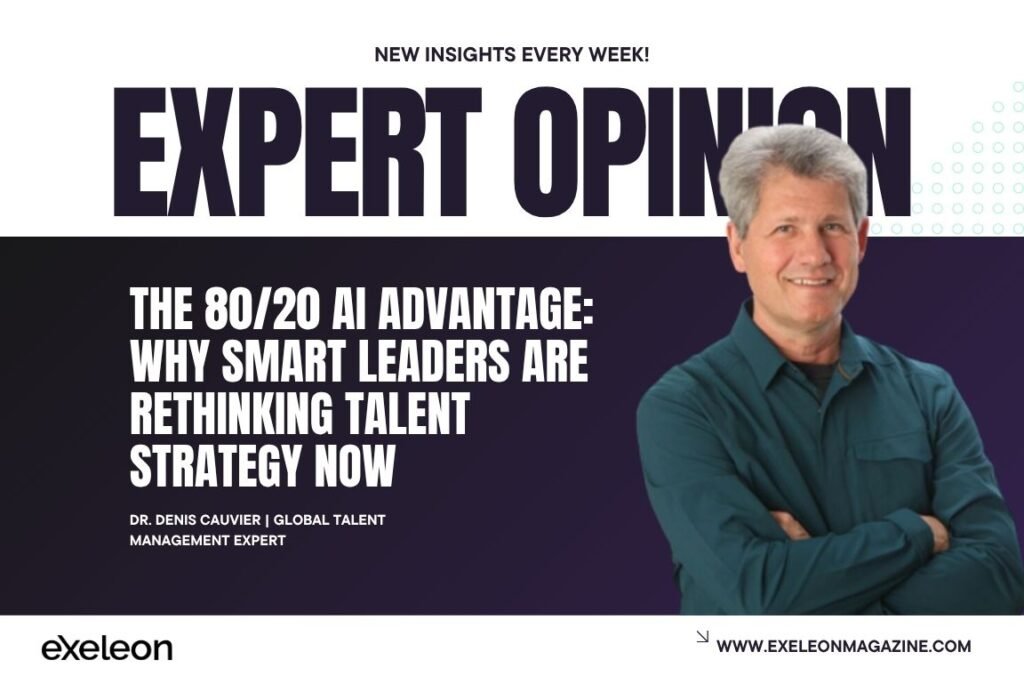This is an Op-Ed piece written by Dr. Denis Cauvier Author of The 80/20 AI Advantage.
In today’s volatile business climate, the race to attract and retain top talent has intensified. Yet, many companies are still relying on outdated hiring methods, gut-based decisions, and manual HR processes—despite mounting evidence that artificial intelligence (AI) can dramatically improve workforce outcomes. For forward-thinking executives, there’s a better way: apply the 80/20 principle through AI-driven talent management.
The Pareto Principle tells us that 80% of results stem from 20% of efforts. In talent strategy, this means that a small number of hiring, retention, and engagement activities drive the majority of organizational success. AI can pinpoint, automate, and optimize those high-leverage actions—giving companies a decisive edge without overhauling their entire infrastructure.
Why AI in Talent Management Is Now a Business Imperative
AI is no longer an HR trend—it’s a business necessity. The World Economic Forum projects that by 2030, AI and automation will create 170 million new jobs while displacing 92 million, leading to a net gain of 78 million positions. That’s a seismic shift. Companies that fail to align hiring and workforce planning with this new reality risk becoming obsolete.
Early adopters like Unilever and Hilton have already achieved tangible success. Unilever reduced time-to-hire by 70% and increased diversity by 16% using AI-powered assessments. Hilton, using AI chatbots and candidate ranking algorithms, cut manual recruitment tasks by 40% and saw an 85% decrease in time-to-interview.
Breaking the Bottlenecks: How AI Streamlines the Talent Lifecycle
- Attracting Top Talent: AI tools can write optimized job ads, identify high-potential passive candidates, and rank applicants in seconds. This increases, hiring efficiency by up to 60% while improving candidate quality.
- Selecting the Right People: Predictive analytics now assess job fit, culture alignment, and future performance with 95% accuracy. Platforms like Pymetrics and Eightfold.ai bring scientific rigor to hiring decisions—eliminating guesswork and bias.
- Onboarding & Retention: AI customizes onboarding paths based on role and personality. Later, it monitors engagement signals, predicts attrition risks, and supports real-time interventions. SHRM reports that 85% of companies using AI for onboarding have seen improved retention within six months.
Overcoming Common Objections
Many executives hesitate to implement AI due to fears around cost, complexity, or compliance. These concerns are increasingly unfounded:
- Cost: Cloud-based AI tools like ChatGPT Team or HireVue require minimal upfront investment and offer rapid ROI. Companies report recruitment cost reductions of up to 40%.
- Complexity: AI adoption doesn’t demand a PhD in data science. Practical implementation can start with small wins—automating resume screening or using chatbots for FAQs.
- Ethics: Ethical AI is not an afterthought. Responsible companies use bias detection audits and inform candidates when AI is in use, aligning with evolving global regulations like GDPR and the EU AI Act.
Scaling Without Breaking the Bank
A major misconception is that AI is only for large enterprises. In reality, mid-size firms and startups are some of the most agile adopters, leveraging AI to compete with larger players. The secret? Focus on high-impact areas.
For instance, creating a custom GPT-powered job description generator can improve clarity, consistency, and fit—boosting the success rate of new hires while saving recruiters hours per week. Multiply that across all roles, and you have a talent engine that gets smarter over time.
The Real Risk: Doing Nothing
According to PwC, companies not using AI in HR experience 25% longer hiring cycles and significantly higher turnover. Worse, Gartner predicts that by 2026, these companies will see a 50% drop in hiring efficiency. In short: inaction has a measurable cost.
Executive Takeaway
As AI continues to evolve, the question for leaders is no longer if they should use AI in talent management—but how to use it effectively. By applying the 80/20 lens, executives can target the most impactful areas of the employee lifecycle, integrate AI incrementally, and realize transformational gains in performance, engagement, and ROI.
About the Author
Dr. Denis Cauvier is a global talent management expert, futurist, and bestselling author of 27 books including his newly released The 80/20 AI Advantage. With over 36 years of experience advising Fortune 500 companies, government agencies, and start-ups in 60+ countries, Denis specializes in helping organizations future-proof their workforce. He is a former banker, serial entrepreneur, and trusted advisor on AI integration in HR.
Follow Dr. Denis Cauvier on LinkedIn.










